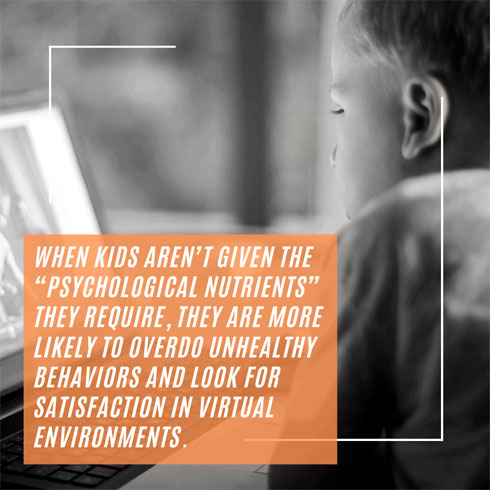Society’s fear of technology destroying our children’s future has reached a fever pitch and many parents have resorted to extreme measures.
A quick search on YouTube reveals thousands of videos of parents storming into their kids’ rooms, unplugging the computers or gaming consoles, and destroying their devices.
But here’s what these parents don’t understand: Technology isn’t the source of the problem, and enforcing arbitrary rules around tech usage isn’t the solution.
Rather, we must understand the root causes of children’s unhealthy relationship with technology if we are going to effectively help them overcome distraction.
Kids have Psychological Needs
Just as the human body requires three macronutrients to run properly (protein, carbohydrates, and fat), the human psyche has its own needs. According to a well-established theory of human motivation known as “Self-Determination Theory,” all of us require three things for psychological well-being.
When kids aren’t given the psychological nutrients they require, they are more likely to overdo unhealthy behaviors and look for satiation elsewhere — often in virtual environments.
Distractions satisfy deficiencies.
If you want to raise children able to deal with a world filled with distractions, these are the three important psychological nutrients you must ensure they receive:

1. Autonomy
It might sound like a horrible idea to some parents, but giving children greater freedom over their choices can actually be a very good thing.
According to one study conducted by two psychology professors, Marciela Correa-Chavez and Barbara Rogoff, Mayan children who have less exposure to formal education show “more sustained attention and learning than their counterparts from Mayan families with extensive involvement in Western schooling.”
In an interview with NPR, Dr. Suzanne Gaskins, who has studied Mayan villages for decades, explained that many Mayan parents give their kids a tremendous amount of freedom. “Rather than having the parent set the goal — and then having to offer enticements and rewards to reach that goal — the child is setting the goal,” she said. “Then the parents support that goal however they can.”
Most formal schooling in America and similar industrialized countries, on the other hand, is the antithesis of a place where kids have the autonomy to make their own choices. In her study, Rogoff notes: “It may that [some American] children give up control of their attention when it’s always managed by an adult.”
What parents can do: Instead of being the one to enforce strict rules on things like screen time, help your kids create their own boundaries. The goal is to get them to understand why their screen time should be limited. The more you make decisions with them, as opposed to for them, the more they may be willing to listen to your guidance.

2. Competence
Think about something you’re good at, like cooking a delicious meal or parallel parking in a tight space. Competence feels good, doesn’t it? And that feeling grows alongside your ability to achieve success in life.
Unfortunately, the joy of progress is a waning feeling among kids today. Too often, kids are given the message that they’re not competent at what they do. Standardized tests, for example, are a major contribution to this problem, because they don’t account for the fact that different kids have different developmental rates.
If a child isn’t doing well in school and doesn’t get the necessary individualized support, they may start to believe that achieving competence is impossible. So they stop trying. In the absence of competency in the classroom, kids turn to potentially unhealthy outlets to experience the feeling of growth and development.
Companies making games, apps and other potential distractions are happy to fill that void by selling ready-made solutions for the psychological nutrients kids lack. They know much consumers enjoy leveling up, like gaining more followers or getting likes. These accomplishments all provide the fast feedback of achievement that feels good.
What parents can do: Reconsider the importance of structured academic or athletic activities, as well as the pressures and expectations surrounding them. Have a discussion with your kid about what they enjoy doing, and encourage them to pursue it in ways that give them a feeling competence.

3. Relatedness
All of us need the feeling of connection. We want to understand others and be understood ourselves. The opportunity to satisfy this need for relatedness in children is provided through play with others.
In today’s world, however, the very nature of play is rapidly changing. Whereas previous generations were allowed to play after school and form close social bonds, many children today are raised by parents who restrict outdoor play, due to baseless fears of “child predators, road traffic and bullies,” according to a survey of parents in an Atlantic article.
“For more than 50 years, children’s free play time has been continually declining, and it’s keeping them from turning into confident adults,” the author noted. Sadly, this downward spiral leaves many kids with no choice but to stay indoors, attend structured programs, or rely on technology to connect with others.
What parents can do: Make sure you give your child time to interact with other kids. Free play, without the direction of parents, coaches, and teachers, gives them the opportunity to connect and relate to peers. If they don’t find relatedness offline, don’t be surprised if they go looking for it online.
How do you feel about screen time and your children? Have you taken steps to help your kids manage their time and attention effectively?
Related Articles
- Schedule Maker: a Google Sheet to Plan Your Week
- Habit Tracker Template in Google Sheets
- The Ultimate Core Values List: Your Guide to Personal Growth
- Timeboxing: Why It Works and How to Get Started in 2024
- An Illustrated Guide to the 4 Types of Liars
- Hyperbolic Discounting: Why You Make Terrible Life Choices
- Happiness Hack: This One Ritual Made Me Much Happier

